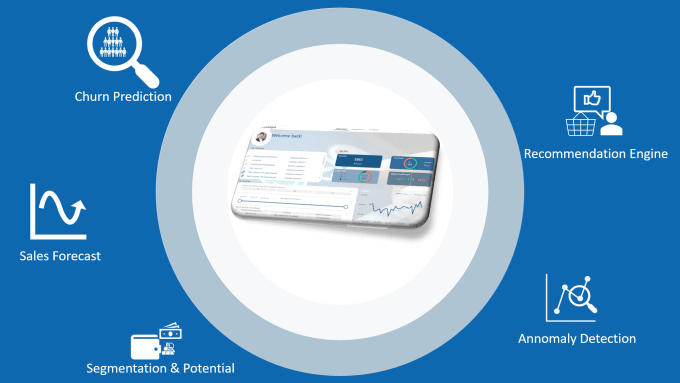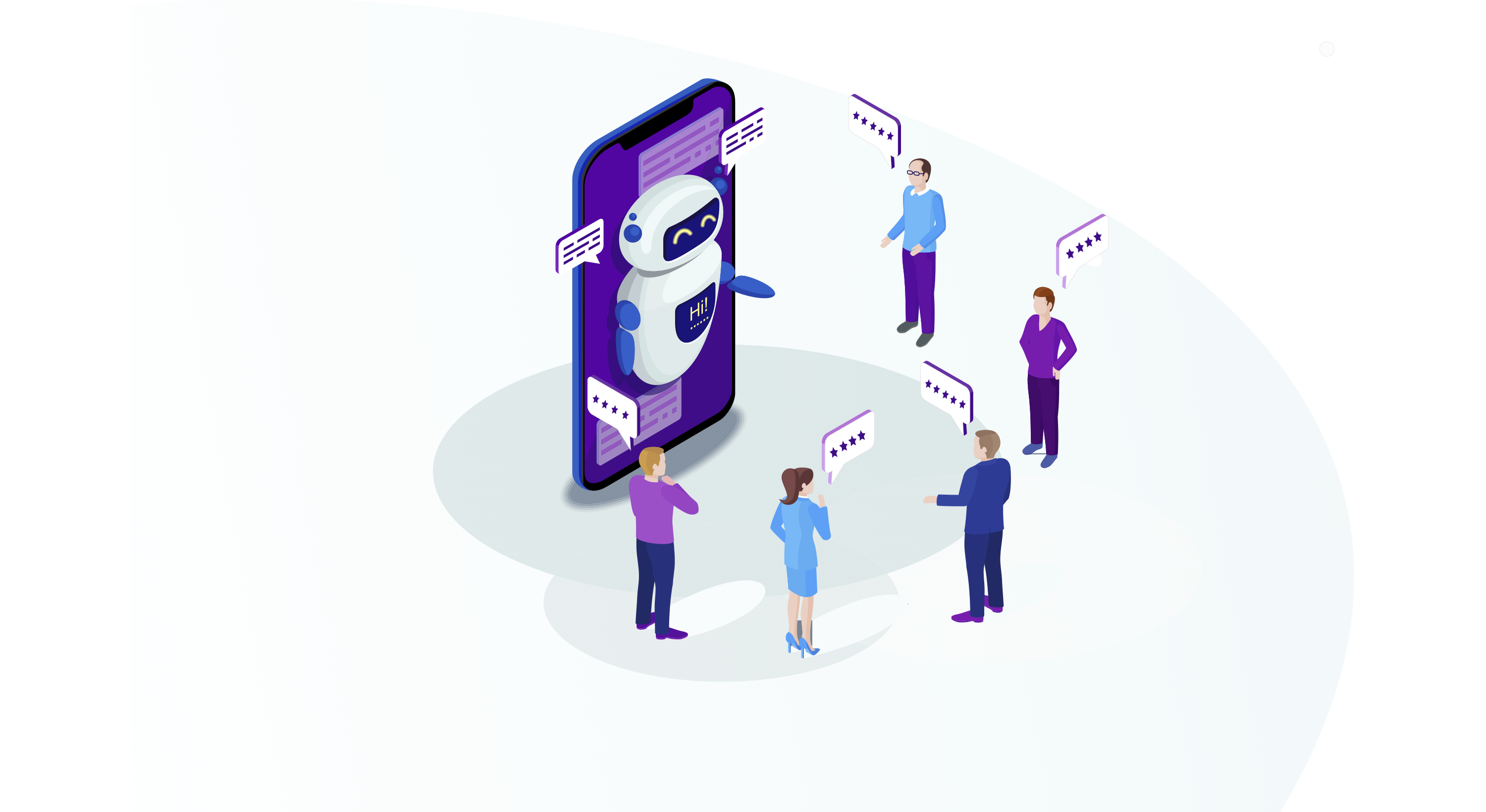
Top AI Tools for Enhancing Sales Efficiency in 2024
May 7, 2024
AI Trends in Telemarketing: What to Expect in and Beyond
May 8, 2024In today’s fast-paced digital landscape, businesses are constantly seeking innovative ways to stay ahead of the curve and maximize their marketing efforts. One avenue that holds immense potential for revolutionizing traditional telemarketing practices is the integration of artificial intelligence (AI). By leveraging AI technologies, businesses can enhance the efficiency, effectiveness, and personalization of their telemarketing campaigns. In this blog post, we’ll explore strategies for seamlessly integrating AI into telemarketing practices to drive better results and stay ahead of the competition.

Understanding the Role of AI in Telemarketing
Artificial intelligence (AI) has emerged as a transformative force across various industries, and telemarketing is no exception. In the context of telemarketing, AI refers to the use of advanced algorithms and machine learning techniques to analyze data, automate tasks, and enhance customer interactions. The role of AI in telemarketing extends beyond simple automation—it empowers businesses to gain deeper insights into customer behavior, personalize marketing efforts, and improve overall efficiency.
One of the primary benefits of integrating AI into telemarketing practices is the ability to enhance targeting and lead generation. Traditional telemarketing campaigns often rely on manual processes for identifying and reaching out to potential leads. However, AI-powered algorithms can analyze vast amounts of data to identify patterns and trends, allowing businesses to target individuals who are more likely to be interested in their products or services. This targeted approach not only increases the likelihood of conversion but also minimizes wasted resources on unqualified leads.
Additionally, AI can significantly improve the effectiveness of telemarketing campaigns by enabling personalized interactions with prospects and customers. By analyzing customer data, including past purchase history, browsing behavior, and demographic information, AI algorithms can generate personalized messaging and offers tailored to individual preferences. This level of personalization not only increases engagement but also fosters stronger relationships with customers, leading to higher retention rates and customer lifetime value.
Moreover, AI-driven telemarketing can enhance efficiency and scalability by automating routine tasks and streamlining workflows. Tasks such as lead scoring, call scheduling, and follow-ups can be automated using AI-powered systems, freeing up human agents to focus on more complex and high-value activities. This not only increases productivity but also ensures consistent and timely follow-ups with leads, ultimately driving better results for the business.
In summary, AI plays a crucial role in revolutionizing telemarketing practices by enabling more targeted, personalized, and efficient marketing efforts. By harnessing the power of AI-powered data analytics, personalization, and automation, businesses can optimize their telemarketing campaigns for greater success in reaching and converting their target audiences.

Leveraging AI-Powered Data Analytics
In the realm of telemarketing, data is king. The ability to gather, analyze, and interpret data is essential for identifying potential leads, understanding customer preferences, and optimizing marketing strategies. AI-powered data analytics tools take this capability to the next level, enabling businesses to extract valuable insights from large datasets and make data-driven decisions with precision and efficiency.
One of the primary advantages of AI-powered data analytics in telemarketing is the ability to gain deeper insights into customer behavior and preferences. Traditional methods of data analysis often involve manual processes and are limited in their ability to process large volumes of data quickly. AI algorithms, on the other hand, can analyze vast amounts of data in real-time, uncovering patterns, trends, and correlations that would be difficult or impossible for humans to identify.
By leveraging AI-powered data analytics, businesses can segment their target audiences more effectively and tailor their marketing efforts accordingly. For example, AI algorithms can analyze customer data to identify segments with similar characteristics or purchase behaviors, allowing businesses to create targeted marketing campaigns tailored to each segment’s preferences and needs. This level of segmentation not only increases the relevance of marketing messages but also improves the likelihood of conversion.
Furthermore, AI-powered data analytics can provide valuable insights into the performance of telemarketing campaigns, allowing businesses to track key metrics such as conversion rates, customer engagement, and return on investment (ROI). By analyzing these metrics in real-time, businesses can identify areas for improvement and optimize their marketing strategies for better results. For example, if a particular campaign is not performing as expected, AI algorithms can analyze the data to identify potential issues and suggest adjustments to improve performance.
In summary, AI-powered data analytics is a game-changer for telemarketing, enabling businesses to extract valuable insights from large datasets and make data-driven decisions with precision and efficiency. By leveraging AI to analyze customer behavior, segment target audiences, and track campaign performance, businesses can optimize their telemarketing efforts for greater success and ROI.

Personalizing Telemarketing Campaigns with AI
Personalization has become a cornerstone of modern marketing, and telemarketing is no exception. In today’s consumer-centric landscape, customers expect personalized experiences that cater to their individual preferences and needs. AI-powered technologies enable businesses to deliver highly personalized telemarketing campaigns that resonate with their target audiences on a deeper level, ultimately driving better engagement and conversion rates.
One of the key benefits of using AI for personalization in telemarketing is the ability to analyze vast amounts of customer data to identify patterns and trends. By analyzing data such as past purchase history, browsing behavior, and demographic information, AI algorithms can generate insights into individual preferences and interests. This allows businesses to tailor their marketing messages and offers to each customer’s unique needs, increasing the likelihood of engagement and conversion.
Moreover, AI-powered personalization enables businesses to deliver targeted marketing messages at the right time and through the right channels. By analyzing customer data in real-time, AI algorithms can identify opportune moments to reach out to prospects and deliver personalized messages that are relevant and timely. Whether it’s a follow-up call after a website visit or a promotional offer based on past purchase behavior, AI-powered personalization ensures that each interaction is meaningful and impactful.
Additionally, AI can facilitate dynamic content customization in telemarketing campaigns, allowing businesses to adapt their messaging based on individual preferences and responses. For example, AI algorithms can analyze customer feedback during a call and dynamically adjust the script or offer to address specific concerns or objections. This level of customization not only enhances the customer experience but also increases the effectiveness of telemarketing interactions.
In summary, AI-powered personalization is a game-changer for telemarketing, enabling businesses to deliver highly targeted and relevant marketing messages that resonate with their target audiences on a deeper level. By leveraging AI to analyze customer data, tailor marketing messages, and adapt content in real-time, businesses can create personalized telemarketing campaigns that drive better engagement, conversion, and customer satisfaction.

Enhancing Customer Interactions with AI-Powered Chatbots
In the realm of telemarketing, customer interactions play a pivotal role in shaping the overall customer experience and influencing purchasing decisions. AI-powered chatbots have emerged as a powerful tool for enhancing customer interactions in telemarketing, enabling businesses to provide instant support, answer queries, and guide prospects through the sales funnel with efficiency and effectiveness.
One of the primary benefits of using AI-powered chatbots in telemarketing is the ability to provide instant and personalized support to customers round the clock. Unlike human agents who are limited by availability and capacity, chatbots can engage with customers at any time of the day or night, ensuring prompt responses to inquiries and assistance with purchasing decisions. This level of accessibility not only improves customer satisfaction but also increases the likelihood of conversion by addressing customer needs in real-time.
Moreover, AI-powered chatbots can enhance the efficiency of telemarketing operations by automating routine tasks and processes. Tasks such as answering frequently asked questions, scheduling appointments, and collecting customer information can be handled seamlessly by chatbots, freeing up human agents to focus on more complex and high-value activities. This not only increases productivity but also ensures consistent and timely support for customers throughout their journey.
Furthermore, AI-powered chatbots can leverage natural language processing (NLP) and machine learning algorithms to understand and respond to customer queries with human-like intelligence. By analyzing customer messages in real-time, chatbots can interpret the intent behind each inquiry and provide relevant and accurate responses. This enables businesses to deliver personalized support and guidance to customers, fostering stronger relationships and driving better outcomes.
Additionally, AI-powered chatbots can facilitate proactive engagement with customers through personalized recommendations and offers. By analyzing customer data and purchase history, chatbots can suggest relevant products or services based on individual preferences and behaviors, guiding customers through the sales funnel with targeted messaging. This not only increases the likelihood of upselling and cross-selling but also enhances the overall customer experience by providing value-added support and assistance.
In summary, AI-powered chatbots are a valuable asset for telemarketing, enabling businesses to enhance customer interactions, improve operational efficiency, and drive better outcomes. By providing instant and personalized support, automating routine tasks, and leveraging machine learning algorithms, chatbots can revolutionize the way businesses engage with customers and deliver exceptional experiences throughout the customer journey.

Implementing AI Ethics and Compliance in Telemarketing Practices
While AI offers numerous benefits for telemarketing, it’s essential for businesses to ensure that AI-powered practices adhere to ethical standards and regulatory compliance. As AI technology becomes increasingly sophisticated, concerns around data privacy, transparency, and bias have come to the forefront, highlighting the importance of implementing ethical and compliant AI practices in telemarketing.
One of the key considerations for implementing AI ethics in telemarketing is ensuring transparency and accountability in the use of AI algorithms and technologies. Businesses should be transparent with customers about the use of AI in telemarketing practices, including how their data is collected, stored, and used to personalize interactions. Additionally, businesses should establish clear guidelines and processes for monitoring and auditing AI algorithms to ensure compliance with ethical standards and regulatory requirements.
Moreover, businesses must prioritize data privacy and security when implementing AI-powered telemarketing practices. This includes implementing robust data protection measures, such as encryption, anonymization, and access controls, to safeguard customer data from unauthorized access or misuse. Additionally, businesses should obtain explicit consent from customers before collecting or using their personal data for telemarketing purposes, ensuring compliance with data protection regulations such as GDPR and CCPA.
Furthermore, businesses should be vigilant about mitigating biases and ensuring fairness in AI-powered telemarketing practices. AI algorithms can inadvertently perpetuate biases present in training data or algorithms, leading to discriminatory outcomes or unfair treatment of certain individuals or groups. To address this, businesses should implement bias detection and mitigation techniques, such as bias audits, fairness assessments, and algorithmic transparency measures, to identify and address biases in AI systems.
Additionally, businesses should prioritize accountability and responsibility in the use of AI in telemarketing practices. This includes establishing clear lines of accountability for AI systems and ensuring that human oversight is maintained throughout the telemarketing process. Businesses should also provide training and education to employees on ethical AI practices and compliance requirements to ensure that AI is used responsibly and ethically in telemarketing operations.
In summary, implementing AI ethics and compliance in telemarketing practices is essential for building trust with customers, mitigating risks, and ensuring responsible use of AI technology. By prioritizing transparency, data privacy, bias mitigation, and accountability, businesses can harness the power of AI to drive better outcomes in telemarketing while upholding ethical standards and regulatory requirements.
Leveraging Predictive Analytics for Targeted Marketing Campaigns
Predictive analytics is a powerful tool that uses historical data, statistical algorithms, and machine learning techniques to forecast future outcomes and trends. In telemarketing, predictive analytics can be leveraged to identify and target high-potential prospects, optimize marketing campaigns, and improve overall campaign effectiveness.
One of the primary benefits of using predictive analytics in telemarketing is the ability to identify and prioritize leads with the highest likelihood of conversion. By analyzing historical customer data and behavioral patterns, predictive analytics models can identify key indicators and characteristics associated with successful conversions, such as purchase history, demographic information, and engagement metrics. This enables businesses to focus their efforts and resources on leads that are most likely to result in sales, maximizing the efficiency and effectiveness of telemarketing campaigns.
Moreover, predictive analytics can help optimize marketing campaigns by identifying trends and patterns in customer behavior and preferences. By analyzing data from past campaigns, predictive analytics models can uncover insights into which marketing strategies, messages, and channels are most effective in driving engagement and conversions. This allows businesses to tailor their marketing efforts to better resonate with their target audience, resulting in higher response rates and ROI.
Furthermore, predictive analytics can enable businesses to forecast future sales and revenue with greater accuracy, allowing them to better plan and allocate resources for telemarketing campaigns. By leveraging historical data and predictive modeling techniques, businesses can generate forecasts and projections for sales performance, customer acquisition, and revenue generation, enabling them to make data-driven decisions and strategies.
Additionally, predictive analytics can enhance lead scoring and qualification processes in telemarketing by automating the identification and categorization of leads based on their likelihood of conversion. By analyzing a wide range of data points and variables, predictive analytics models can assign lead scores to individual prospects, indicating their readiness to purchase and their potential value to the business. This enables telemarketing teams to prioritize leads more effectively and focus their efforts on prospects with the highest likelihood of conversion, increasing overall sales productivity and efficiency.
In summary, predictive analytics is a valuable tool for telemarketing, enabling businesses to identify high-potential prospects, optimize marketing campaigns, and improve overall campaign effectiveness. By leveraging historical data, statistical algorithms, and machine learning techniques, businesses can gain valuable insights into customer behavior and preferences, enabling them to make more informed decisions and strategies in their telemarketing efforts.

Harnessing AI-Powered Voice Recognition for Personalized Customer Interactions
Voice recognition technology, powered by artificial intelligence, has transformed the way businesses interact with customers in telemarketing. By leveraging AI algorithms, businesses can analyze spoken language and extract valuable insights from customer conversations, enabling personalized interactions and enhanced customer experiences.
One of the key benefits of using AI-powered voice recognition in telemarketing is the ability to understand and interpret customer sentiments and emotions in real-time. By analyzing the tone, pitch, and intonation of customer voices, AI algorithms can identify subtle cues and indicators of customer satisfaction, frustration, or interest during conversations. This enables businesses to tailor their responses and messaging to better meet the needs and preferences of individual customers, enhancing overall satisfaction and engagement.
Moreover, AI-powered voice recognition can enable businesses to automate call transcription and analysis, freeing up human agents to focus on more value-added tasks. By transcribing and analyzing customer conversations in real-time, AI algorithms can extract valuable insights and information, such as product preferences, pain points, and buying signals, which can be used to personalize future interactions and marketing efforts. This not only increases efficiency and productivity but also enables businesses to deliver more relevant and targeted messaging to customers.
Furthermore, AI-powered voice recognition can facilitate seamless integration with customer relationship management (CRM) systems, enabling businesses to capture and track valuable customer data and insights from telemarketing interactions. By automatically recording and analyzing customer conversations, AI algorithms can update CRM records in real-time with valuable information, such as contact details, purchase history, and interaction notes. This ensures that businesses have a comprehensive view of each customer’s journey and preferences, enabling them to deliver more personalized and effective telemarketing campaigns.
Additionally, AI-powered voice recognition can enable businesses to identify and analyze patterns and trends in customer conversations, enabling them to uncover valuable insights and opportunities for improvement. By aggregating and analyzing data from multiple interactions, AI algorithms can identify common pain points, objections, or questions raised by customers, enabling businesses to proactively address them and optimize their telemarketing strategies. This continuous feedback loop enables businesses to stay agile and responsive to changing customer needs and market dynamics, driving continuous improvement and innovation in their telemarketing practices.
In summary, AI-powered voice recognition technology offers numerous benefits for telemarketing, enabling businesses to understand customer sentiments, automate call analysis, integrate with CRM systems, and uncover valuable insights from customer conversations. By leveraging AI algorithms to analyze spoken language and extract valuable insights, businesses can personalize customer interactions, optimize marketing campaigns, and drive better outcomes in telemarketing.



